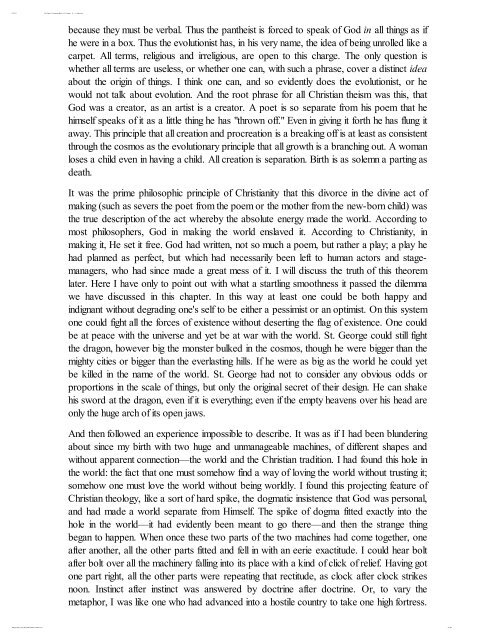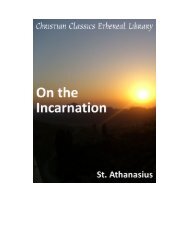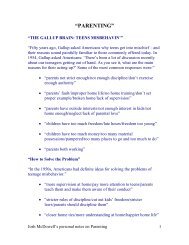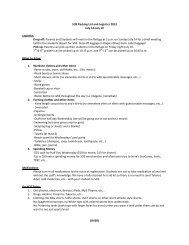Pdf Copy of Orthodoxy, by G.K. Chesterton - Christ United Methodist ...
Pdf Copy of Orthodoxy, by G.K. Chesterton - Christ United Methodist ...
Pdf Copy of Orthodoxy, by G.K. Chesterton - Christ United Methodist ...
You also want an ePaper? Increase the reach of your titles
YUMPU automatically turns print PDFs into web optimized ePapers that Google loves.
9/ 27/ 12 The Pr oject G ut enber g eBook <strong>of</strong> O r t hodoxy, G . K. Chest er t on<br />
www. gut enber g. or g/ f iles/ 16769/ 16769- h/ 16769- h. ht m<br />
because they must be verbal. Thus the pantheist is forced to speak <strong>of</strong> God in all things as if<br />
he were in a box. Thus the evolutionist has, in his very name, the idea <strong>of</strong> being unrolled like a<br />
carpet. All terms, religious and irreligious, are open to this charge. The only question is<br />
whether all terms are useless, or whether one can, with such a phrase, cover a distinct idea<br />
about the origin <strong>of</strong> things. I think one can, and so evidently does the evolutionist, or he<br />
would not talk about evolution. And the root phrase for all <strong>Christ</strong>ian theism was this, that<br />
God was a creator, as an artist is a creator. A poet is so separate from his poem that he<br />
himself speaks <strong>of</strong> it as a little thing he has "thrown <strong>of</strong>f." Even in giving it forth he has flung it<br />
away. This principle that all creation and procreation is a breaking <strong>of</strong>f is at least as consistent<br />
through the cosmos as the evolutionary principle that all growth is a branching out. A woman<br />
loses a child even in having a child. All creation is separation. Birth is as solemn a parting as<br />
death.<br />
It was the prime philosophic principle <strong>of</strong> <strong>Christ</strong>ianity that this divorce in the divine act <strong>of</strong><br />
making (such as severs the poet from the poem or the mother from the new-born child) was<br />
the true description <strong>of</strong> the act where<strong>by</strong> the absolute energy made the world. According to<br />
most philosophers, God in making the world enslaved it. According to <strong>Christ</strong>ianity, in<br />
making it, He set it free. God had written, not so much a poem, but rather a play; a play he<br />
had planned as perfect, but which had necessarily been left to human actors and stagemanagers,<br />
who had since made a great mess <strong>of</strong> it. I will discuss the truth <strong>of</strong> this theorem<br />
later. Here I have only to point out with what a startling smoothness it passed the dilemma<br />
we have discussed in this chapter. In this way at least one could be both happy and<br />
indignant without degrading one's self to be either a pessimist or an optimist. On this system<br />
one could fight all the forces <strong>of</strong> existence without deserting the flag <strong>of</strong> existence. One could<br />
be at peace with the universe and yet be at war with the world. St. George could still fight<br />
the dragon, however big the monster bulked in the cosmos, though he were bigger than the<br />
mighty cities or bigger than the everlasting hills. If he were as big as the world he could yet<br />
be killed in the name <strong>of</strong> the world. St. George had not to consider any obvious odds or<br />
proportions in the scale <strong>of</strong> things, but only the original secret <strong>of</strong> their design. He can shake<br />
his sword at the dragon, even if it is everything; even if the empty heavens over his head are<br />
only the huge arch <strong>of</strong> its open jaws.<br />
And then followed an experience impossible to describe. It was as if I had been blundering<br />
about since my birth with two huge and unmanageable machines, <strong>of</strong> different shapes and<br />
without apparent connection—the world and the <strong>Christ</strong>ian tradition. I had found this hole in<br />
the world: the fact that one must somehow find a way <strong>of</strong> loving the world without trusting it;<br />
somehow one must love the world without being worldly. I found this projecting feature <strong>of</strong><br />
<strong>Christ</strong>ian theology, like a sort <strong>of</strong> hard spike, the dogmatic insistence that God was personal,<br />
and had made a world separate from Himself. The spike <strong>of</strong> dogma fitted exactly into the<br />
hole in the world—it had evidently been meant to go there—and then the strange thing<br />
began to happen. When once these two parts <strong>of</strong> the two machines had come together, one<br />
after another, all the other parts fitted and fell in with an eerie exactitude. I could hear bolt<br />
after bolt over all the machinery falling into its place with a kind <strong>of</strong> click <strong>of</strong> relief. Having got<br />
one part right, all the other parts were repeating that rectitude, as clock after clock strikes<br />
noon. Instinct after instinct was answered <strong>by</strong> doctrine after doctrine. Or, to vary the<br />
metaphor, I was like one who had advanced into a hostile country to take one high fortress.<br />
44/ 100





